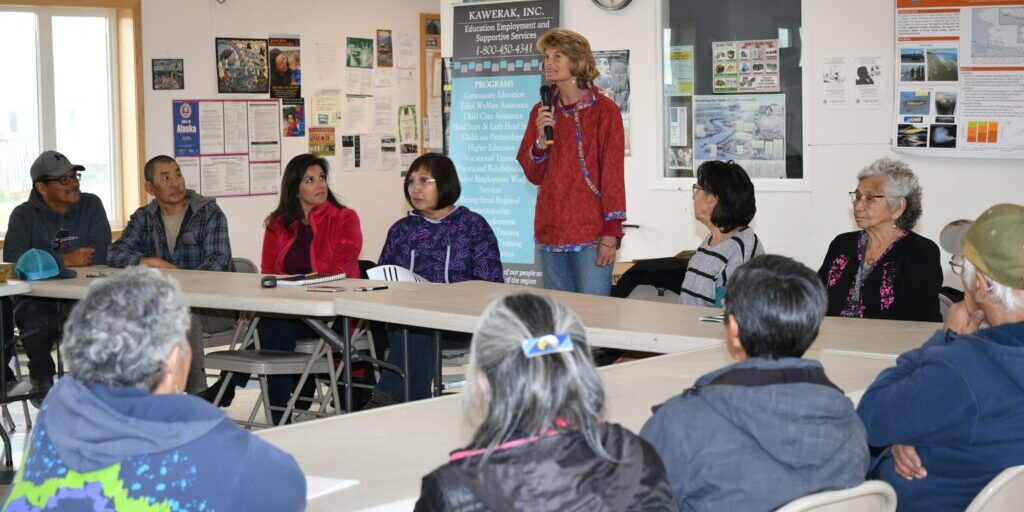Senator Lisa Murkowski came through the Bering Strait region late last week, visiting three communities she has never been to before: Teller, Wales, and Brevig Mission.
On her way back to Anchorage on Saturday, Murkowski told local leaders in Nome that her visits to rural Alaska help her communicate the region’s unique needs with leaders in Washington.
“In all honesty, I worry everyday about those very Alaska specific programs that we have… everything that is unique to us, I feel like I’ve got to guard very possessively.”
All three villages told the Senator that overcrowding is a problem. Brevig Mission Tribal Coordinator Darla Tocktoo estimates that the community may need as many as thirty homes.
“Sometimes in some homes, you have twenty or more people living together under one roof in a three-bedroom house. There are so many multiple families living together.”
Tocktoo is also concerned about the quality of water. While Brevig Mission does have piped water in most of the community, she says their facilities need more work and that boil-water notices are frequent.
In contrast, Wales and Teller do not have piped water outside of the local school and teacher houses. Murkowski told KNOM that in those communities, having enough clean water is a huge concern.
“You can’t talk about wellness if you can’t be clean and have clean water. Some very basic issues there.”
In her recent trips to rural Alaska, residents have told Senator Murkowski that regulatory issues are huge hurdles in getting water to their communities. The Environmental Protection Agency and Indian Health Services have requirements for grant eligibility that many villages struggle to meet.
Megan Alvanna-Stimpfle focuses on water and sewer issues for Kawerak and Norton Sound Health Corporation. She offered an example of the challenges local communities face. The funds that the Environmental Protection Agency has set aside for tribal sewer and water, she says, require a community to have a certified operator, but the region only has $19,000 a year for certified operator training. That training and funding comes through the Indian Health Services.
And while Senator Murkowski admits that those can be difficult and slow hurdles to overcome, those are the things she can help address.
“Some of it goes to the very direct question that I raised here as to whether or not there’s been communication between IHS and EPA when it comes to some of these water and wastewater issues… helping to facilitate some of those conversations between the agencies. Because I think sometimes, they don’t know what happens beyond their agency. So, to be able to sit and listen to practical application was important.”
Tocktoo thinks Senator Murkowski learned a lot from her time in Brevig Mission and other Bering Strait communities.
“I think a lot of people really enjoyed her visit. I think she’s a really good advocate for Alaska.”
If Tocktoo could pick one tangible result that comes from Murkowski’s visit, she says she would like to see more funding made available for building housing in the region.
Some of the other concerns Senator Murkowski heard included climate change and its impact on subsistence. Rather than pass federal, climate-related legislation, she says she focuses her work in the Energy and Natural Resource Committee on finding local energy solutions so that communities aren’t reliant on sources like diesel.
Right now, Senator Lisa Murkowski isn’t sharing whether or not she has firm next steps planned after her trip to Western Alasaka, but she did say multiple times that it was “important” for her to hear from the people in the Bering Straits region.
Image at top: Senator Murkowski speaks at a community meeting in Brevig Mission. Photo courtesy of Karina Peterson Borger.




